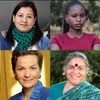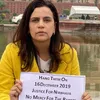They are not afraid to kill. Yet, this tribal rights activist continues to rehabilitate militants in North East
Ananya Paul Dodmani is a tribal rights activist working towards counselling of former militants in Assam. She is also a sustainable menstruation warrior and believes education can change disturbed lives for the better.
Ananya Paul Dodmani’s life took a drastic turn when her father was kidnapped by militants when she was in college.
The trauma she underwent during that time shaped her life as a tribal rights activist, bringing her into the forefront, rehabilitating militants in Assam, and helping its residents lead quality lives.

Reliving the incident, Ananya says, “When my father was kidnapped, the militants tortured him for 4-5 days and called up his business associate to ask for ransom, but he remained strong through the entire ordeal. One day, when it was raining heavily, the militants got drunk and my father could slip away. He ran 50 km to the nearest railway station and came back home.”
After the incident, her father suffered multiple heart attacks and while he recovered over time, he was not the same person as before.
Towards tribal welfare

Ananya with school children
Shocked and prompted into action by this turn of events in her family, Ananya, based in Guwahati, her hometown, began working with the tribals for their upliftment and started trying to rehabilitate those who had turned to militancy due to external forces.
By then, she had also completed her master’s in criminal psychology from Kolkata University, and had also started her consultancy in the field.
In between, she fell in love with her husband, Abhishek, who she met in a Yahoo Chat room in 2002, married him in 2005, and moved to Hubballi (Hubli) in Karnataka.
But this change in her life did not deter her from her foremost goal, helping the tribals of the North East. In fact, with the support of her like-minded husband, she began extending a helping hand to the Kumbis and Siddhis, tribals from the Uttara Kannada district in Karnataka.
Working parallelly on both initiatives means Ananya travels to the North East every fortnight.
Rehabilitation is a very difficult task. Ananya has first-hand experience of what it takes to change people who she says have been “brainwashed” to follow a certain path.
“Even when militants surrender, the stigma still exists. If they don’t have proper jobs, they will eventually go back to militancy. People were skeptical of my intent and kept questioning whether it would work and whether my personal past will come in the way,” she says.
She followed the advice of her husband who constantly reminded her, “If there is love around, people will always change, keep on trying, if there is consistency in what you do, it will work.”
Empowering women

Ananya in one of her discussions with women
With funds from like-minded people, Ananya was able to build a school with a community hall. It also had a changing room for girls who were hesitant to come to school when it rained or when they were on their period. The community hall is used as a meeting place for people to voice their problems, showcase folklore and others.
Ananya also holds the patent for a biodegradable sanitary pad. She presents workshops all over India to women how to produce them, thus empowering their lives financially. Almost 20,000 people have benefitted from her efforts in this field.
Initially, Ananya and her husband took care of all the initiatives on their own with help from like-minded people. In 2017, they registered their efforts as a non-profit under the name Saksham Foundation.
“The locals in every village are my biggest volunteers. I handover the resources to them to be distributed as they deem fit. When cyclone Amphan rampaged the Sunderbans region recently, we were able to distribute groceries to 10,000 people with help from locals,” she says.
Tragedy and life after

Ananya, in one of her interactions in a tribal area.
Despite the fortitude and determination Ananya possessed, tragedy struck her in 2014, when she was shot by militants, dragged to the forest, and left to die. Recalling the incident, she says, “They shot me in the knee and shoulder, and threw me into the forest. I became unconscious and thought I would die. I was eventually rescued by the Army.”
The same people, Ananya says, matter-of-factly, have now realised her steadfastness in belief towards change in the North East. They honour her by washing her feet and call her ‘Maa’.
Despite this horrible tragedy, she believes no one is born a criminal. “Give them love and proper counselling. The porous border brings with it the real trouble, making things difficult with external forces seeping in with malicious intent,” she adds.
To keep the women occupied during the pandemic, the pad units have now turned into units producing masks. They have already produced and distributed 30,000 masks in the tribal belt. Once they are busy, they have no time to think of militancy, says Ananya.
The COVID-19 situation has also not affected the region much because there is very less movement of people in and out of it.
Getting funds for her efforts have not been easy. She uses 95 percent of the consultation fees towards the cause along with other donations.
Soldier without uniform

Ananya enjoying a carrom game with children
Some of her recent initiatives include helping tribals in West Bengal make handloom products and introducing education to remote areas in Nagaland and Mizoram.
“All I need is some structure in the village, like a temple or a community hall, to start education. I also try to get a teacher who can come to teach. In one place, we gathered the children under a banyan tree,” she says.
I ask her why there exists a discrimination towards people of the North East. She believes the efforts to intermingle must come from both sides.
“When the North East people come to other states, they mostly stick to their own group. In the same way, when people from other states visit the region, they think people with Mongoloid features are Chinese. These perceptions have change, to culminate in an “Indian” identity,” she says.
Ananya was awarded the Karmaveer Chakra in 2019, the global civilian honour given by the international confederation of NGO (iCONGO), in partnership with the United Nations to people across the globe for relentless courage.
While she was overwhelmed with the recognition, the activist also believes it’s also a responsibility she has to live up to.
When asked about her family life, she laughs and says, “Whenever I leave for the North East, my 13-year-old son says, ‘Please come back in one piece.’”
She may laugh it off, but she also explains it’s a huge risk she is taking. She has health issues and suffers from hypertension. If she dies, she says, the government will not do anything, even claim her body. “We are soldiers without uniform,” she emphasises.
Meanwhile, undeterred by the stark reality, Ananya is onto her next project, which will hopefully kick off after the pandemic. She wants to develop a fully-digitised village in West Karbi Anglong as a pilot project and replicate it throughout the country.
We’ll have all heard of the maxim, “What doesn’t kill you, makes you stronger.” Ananya Paul Dodmani is living proof.
Edited by Megha Reddy









